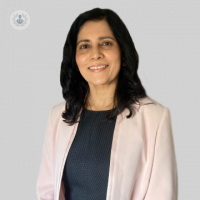All you need to know about lens implants
Written in association with:Many people experience a decline in vision quality and sharpness as they age which often means they rely on glasses or contact lenses to see well. Lens implants and reflective lens exchange surgery can help many people to improve their quality of sight and can, in some cases, even allow them to become spectacles-free. In this expert guide to refractive lens exchange surgery, leading consultant ophthalmologist Miss Velloor Jayshree Menon details the different types of lens implants available and answers commonly asked questions about the procedure and the recovery period that follows.

What are lens implants?
A lens implant is an artificial lens made from acrylic or silicone that is placed within the eye after cataract surgery. The strength of the lens is calculated before surgery and is usually selected to give good distance vision.
Will I need glasses after lens replacement?
This depends on the type of intraocular lens implant used. Implants may be monofocal, multifocal or extended depth of focus (EDOF) lenses.
Monofocal lenses aim to provide good uncorrected distance vision (such as for driving) and is the most commonly implanted lens type worldwide. If you have had a monofocal lens implant, you may find that you can watch television or even drive without glasses. However, glasses may be needed for reading and for intermediate vision (such as a computer screen or a music sheet).
Multifocal lenses aim to provide good vision for distance, intermediate and near vision. With a multifocal lens implant, you may only need glasses for reading fine print.
EDOF lenses also aim to provide good unaided distance and intermediate vision. With an EDOF lens you may find that both distance vision and intermediate vision are good without the need for glasses. Near vision for larger print can also be achieved without spectacles provided the lighting is good. However, spectacles may be needed for reading fine print.
In general, both multifocal and EDOF lenses aim to reduce spectacle dependence but may not eliminate the need for spectacles altogether.
Who is a candidate for refractive lens exchange?
Refractive lens exchange (RLE) is undertaken for patients who do not have a cataract but would like to reduce their dependence on spectacles or contact lenses. It can be performed to correct short sightedness, long sightedness or astigmatism. RLE is suitable for patients over the age of fifty or in younger patients as an alternative to refractive laser surgery.
Are lens implants safe?
Yes, lens implants are very safe and generally patients enjoy improved vision with no side-effects.
How long does it take to recover from lens implantation?
Recovery from lens implant surgery is usually very quick. As described earlier, the vision improves noticeably within the first forty-eight hours and steadily improves over the first two weeks.
How long do lens implants last?
Lens implants are designed to last a lifetime and do so in the vast majority of patients.
If you think you could benefit from lens implants and wish to discuss your options further, you can book a consultation with Miss Menon and learn more about her by visiting her Top Doctors profile.


